If your feed has been like mine for the last three months, you’ve seen and heard all the stories about machine learning tools and what they mean for creative businesses. Since it was launched in November, OpenAI’s ChatGPT has been the center of a whole set of conversations about creativity, work, and the acceleration of technology across the economy.
For those of you living under a rock, ChatGPT is a piece of software that generates text in response to prompts you give it. It’s learned to make text that’s comprehensible to most people most of the time by analyzing huge amounts of text written by others. It’s built on artificial intelligence technologies, so “learning” and “training” are applicable words. It’s supposed to get better over time.
But I wanted to know what it actually does, and where it fit into a political landscape.
So I signed up for an account, spent 10 minutes proving to myself that I could make it work, and then designed a little experiment. At the end of my day, I’d spend 30 minutes asking ChatGPT to do some of the things I’d done throughout the day. I planned the tasks ahead of time, but not the prompts.
I read one article and browsed a Reddit thread about best practices, so I had about 30 minutes worth of prep on using the tool. Here’s what happened:
Press Releases
I thought a lot about the first exercise. I wanted something that was broad enough that the machine had a body of work to draw from, but it should also be able to differentiate partisan values.
I entered the following prompt: Can you write a press release for Georgia State Representative Julian Johnson opposing gun violence?
Here was the response:
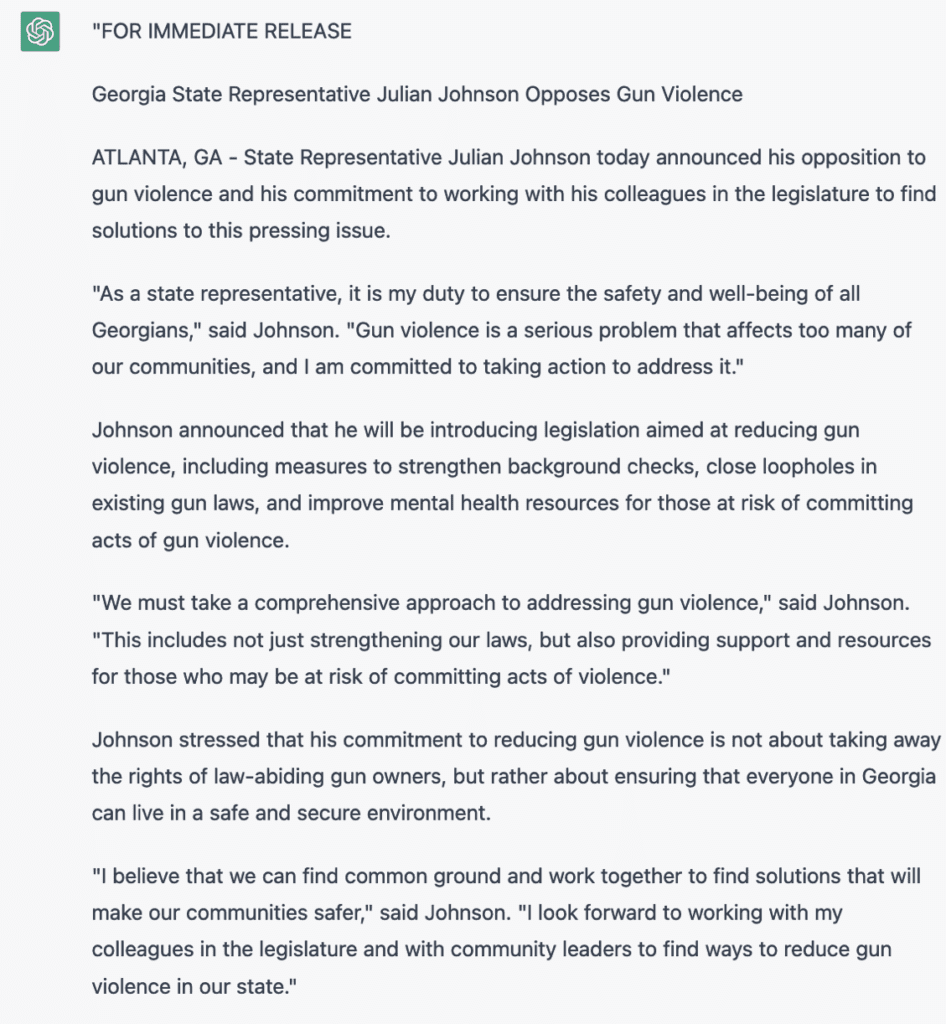
That was surprisingly thorough and surprisingly bland, so I gave it the following edit:
Write a press release for Georgia state representative Julian W. Johnson opposing gun violence. Include the following information: The date is Feb 1, 2023. The phone number for the contact is (555)-987-6543. The email address is info@julianjohnsoncampaign.com
Quote Representative Johnson as saying “Gun violence has come to affect us all. We all live with the fear of a gunman at our children’s school, at our grocery stores, at concerts, and parks. It’s past time to put our constituents’ fears at ease.” It should be no more than 350 words.
And it responded:
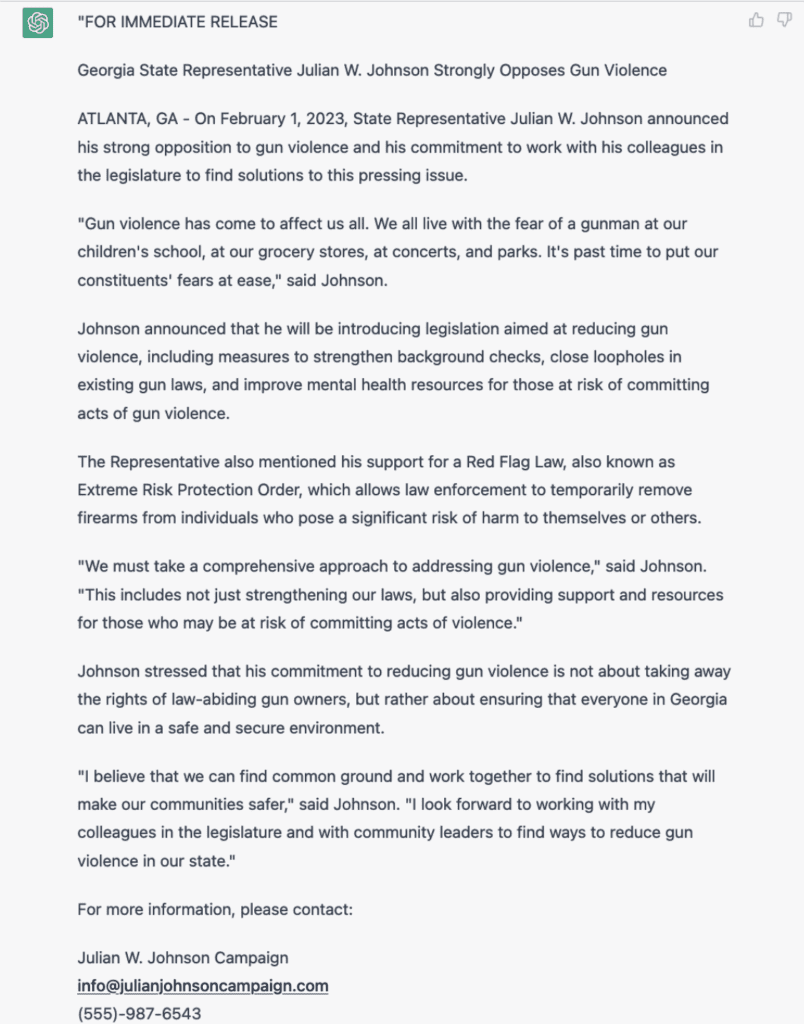
That struck me as passable work. In four minutes, I’d looked at two drafts and given feedback. I moved onto the next test.
Fundraising Email
I started a new chat and gave it the following prompt. “write a fundraising email for julian johnson’s campaign for Nashville city council kickoff. Less than 250 words. Ask for $30.”
And it responded:
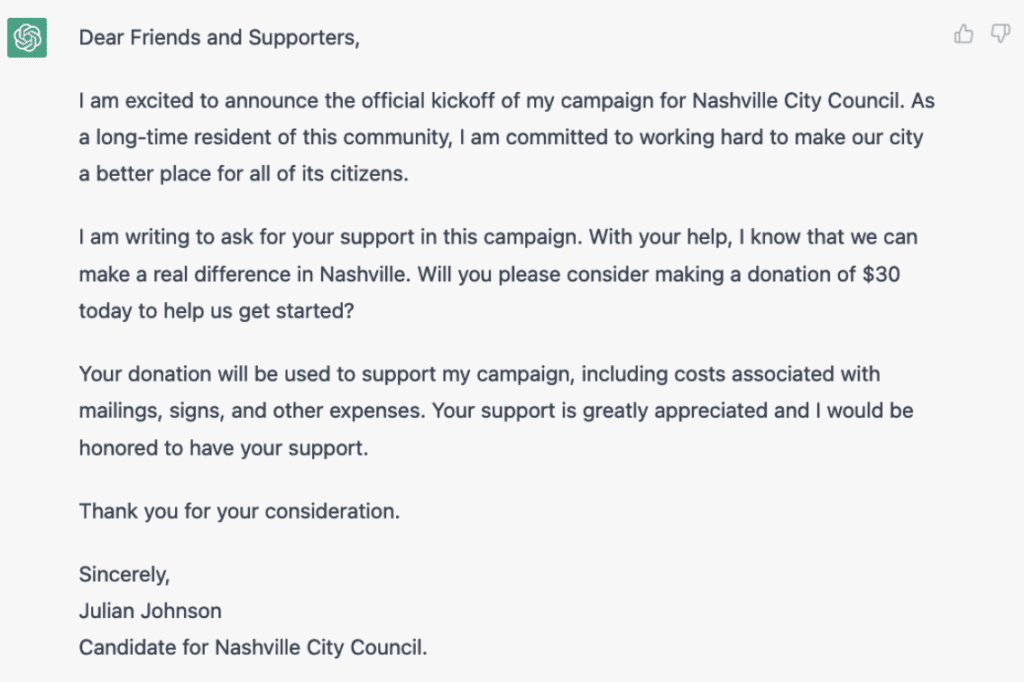
Which, again, is shockingly vapid. But it included an ask about yard signs, so I am now completely convinced that the machine is training on conversations with candidates. That may be valuable later.
I gave it the following edit: “Write a fundraising email for Julian Johnson’s campaign for Nashville city council kickoff. Less than 250 words. Ask for $30. Include lines “I believe in this city. I believe that we can do more and be more.” and “The next phase of our city shouldn’t be about the big things. It should be about the small things, the things that make a difference in the lives of people in our city.”
And it responded:
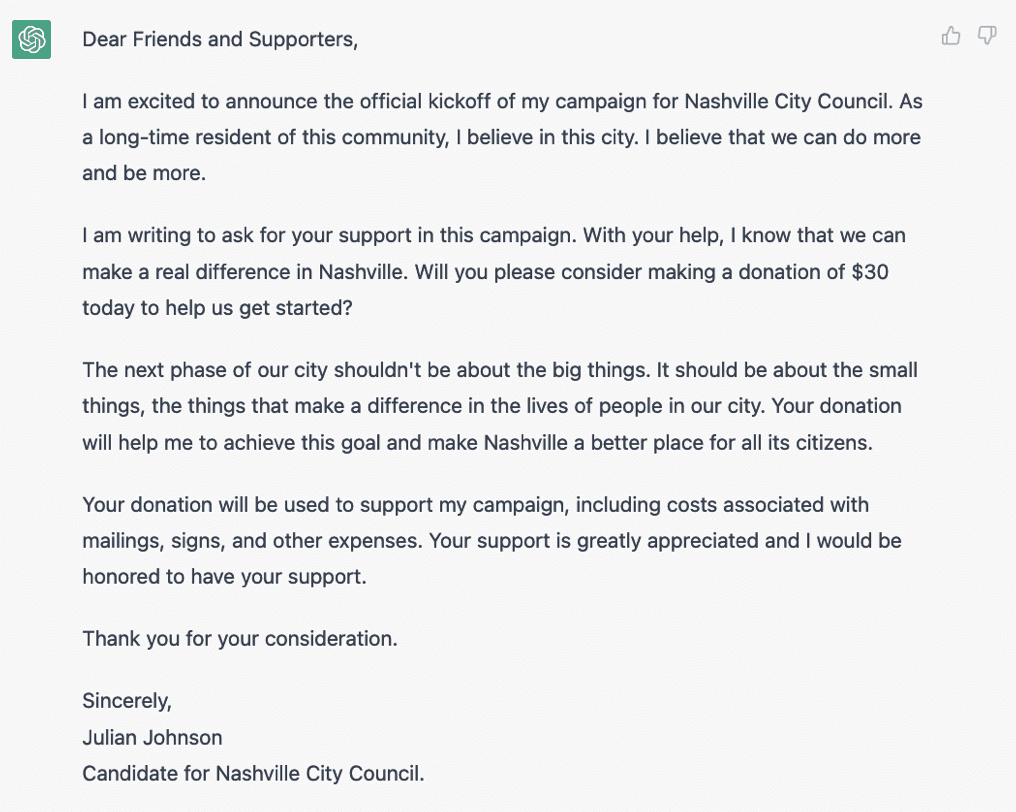
That still just isn’t good. So I gave it a direction to try to unstick it.
“Write a fundraising email for Julian Johnson’s campaign for Nashville city council kickoff. Less than 250 words. Ask for $30 at least two times. Include lines “I believe in this city. I believe that we can do more and be more.” and “The next phase of our city shouldn’t be about the big things. It should be about the small things, the things that make a difference in the lives of people in our city.” Include a joke about a dog.”
There’s two new bits there – a basic fundraising email principle of including multiple asks, and telling it to include a joke about a dog.
And it responded:
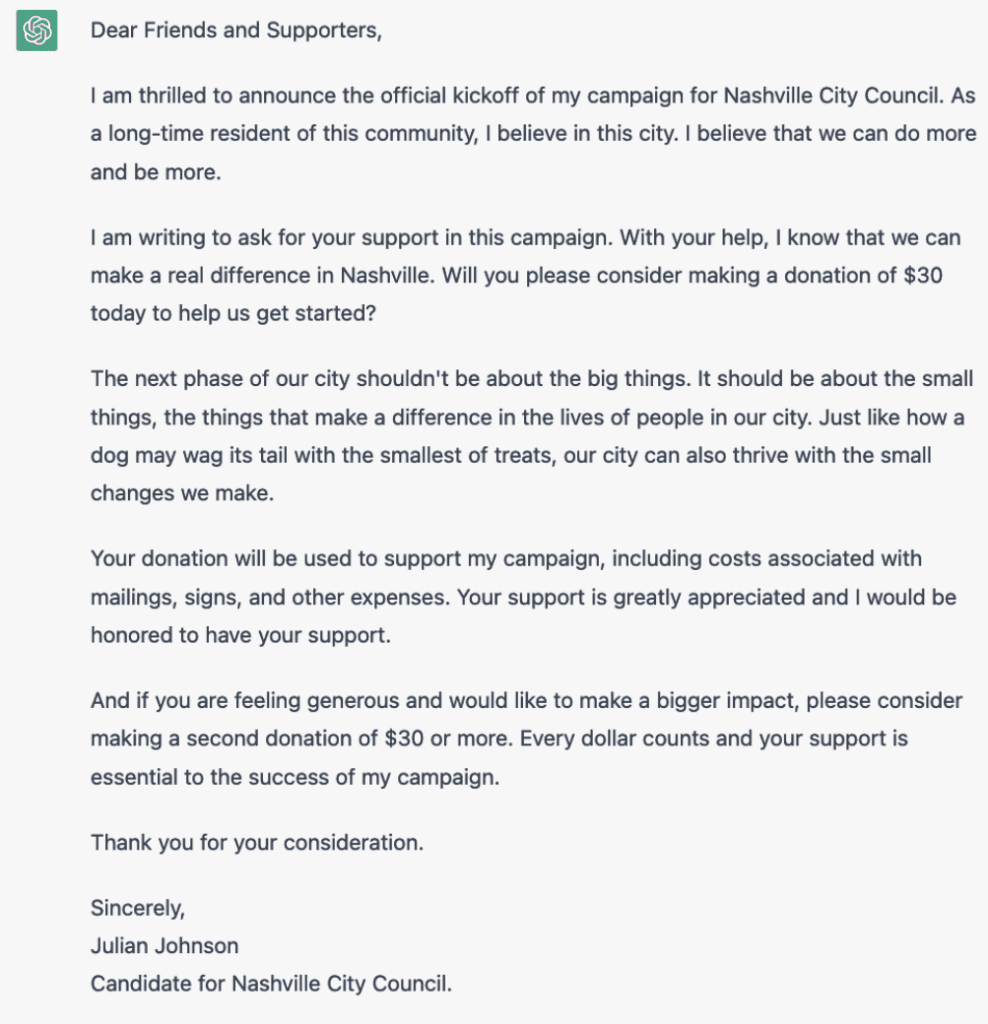
This is the first time I’ve made the thing just fail. Later, I would go back and ask it to tell me a joke about a dog absent the larger assignment and it has lots of jokes. There may be a way to work with the tool and make it use humor in context, but that wasn’t going to happen in the course of the time I’ve given myself.
And what it did with the second ask — “If you’re feeling generous, consider making a second donation” — I don’t know about writing fundraising email, but it could have a future as an organizer. Jumped straight for the escalation. Props, but not the task at hand.
Social Posts
I gave up on the fundraising email. I’d spent 14 of my 30 minutes trying to get past a bad draft. I’ve spent a lot longer than that, but it left me just 12 minutes to dive into what it could do with social media posts.
I’ve assumed that since the machine was trained on the writing found on the internet that it would thrive on social content. We know that the social API’s feed straight into every algorithmic content sorter, so it seems fair to assume that social posts are ChatGPT’s native language. I’d had a couple of ideas to give the machine a workout and see how it worked within specific contexts.
I fed it the first social prompt: Write a social post less than 100 words opposing crypto currency regulation. Reference security of the blockchain, decentralization, and the advantages of working outside traditional banks.
And it responded:

That looks like a Ted Cruz tweet, so it’s clearly possible for the machine to produce the form. But that’s not really time-saving work. I wanted to try to make something a little closer to scale.
Next prompt: Write six different social media posts opposing regulations on crypto currency. Each post should be no less than 50 words or more than 100. Include references to over regulation, the security of the blockchain, the advantages of decentralization, and not being dependent on banks.
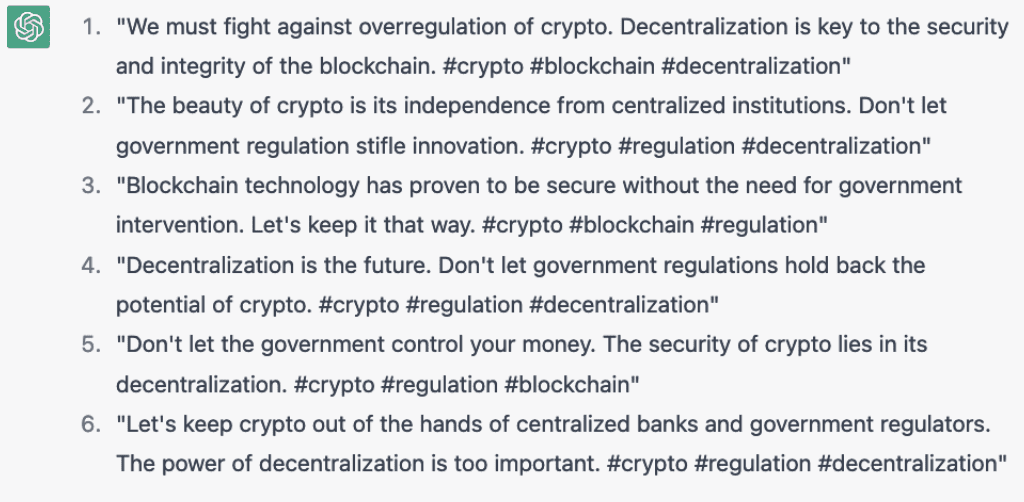
Like the first drafts of most things we’ve tried, it’s a little bland, but could be polished into something usable, especially when you’re spreading those out over time in a social calendar.
And then it occurred to me that those posts were repetitive because I wasn’t giving it enough context. So I gave it a bigger assignment: I asked it to write about housing policy using specific data from a Houston housing non-profit – the Center for Civic and Public Policy Improvement.
Prompt: Write two social media posts about the need for affordable housing in Houston, Texas. Reference data from https://ccppi.org
And it responded:
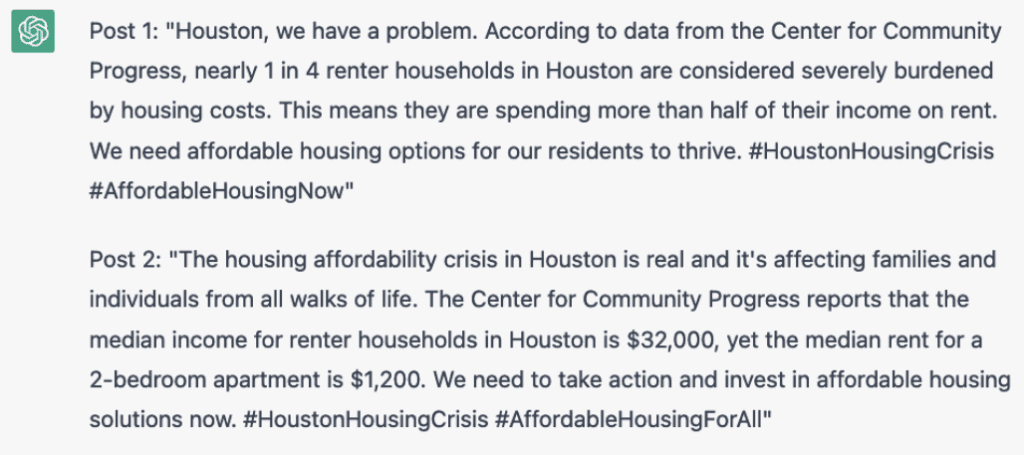
“Houston we have a problem.” That’s the first time in this adventure that it had felt eerie. We just jumped past uncanny valley and straight into the realm of things I’d use.
And with that I was out of time.
In half an hour without interruptions, ChatGPT and I had written two drafts of a press release and gotten it into client-feedback condition, done three drafts of a fundraising email that weren’t going to see the light of day, and done nine social posts of sufficient sophistication for their audiences.
To echo criticisms that have been repeated in conversations about the tools, it has some limitations. It hasn’t trained on anything since 2021. It couldn’t tell me who Tyre Nichols was or write a post about his death. I haven’t been able to make it understand nuances in tone. As seen in the email example, it can tell a joke, but it can’t use a joke in context.
In the press release exercise, it added a policy position between drafts. In the first draft, there’s no mention of a red flag law. In the second draft, our fictitious state representative is supporting them. Given the nature of political work, that gives me pause.
I found the exercises fascinating. It wasn’t unlike working with an entry-level writer, but one who was blazingly fast. Like most creative work, the quality of the output seemed to have a lot to do with the quality of the direction.
After this short session of experimentation, the real value I’m imagining is the speed of the first draft. If you struggle with getting past the blank page or the constant toggling between tasks that plagues the day of a small business owner, this could easily find a place in your workflow. You can woodshed more ideas and get to the refining process of a document quickly.
As someone who counts himself as a creative and respects and pays people for that work, it’s terrifying stuff. But as someone with a to-do list to get through, and as someone who values collaboration, I can imagine it as a toolset that becomes a regular part of my day.
Matthew “Mudcat” Arnold is managing partner at Corsair Campaigns.

